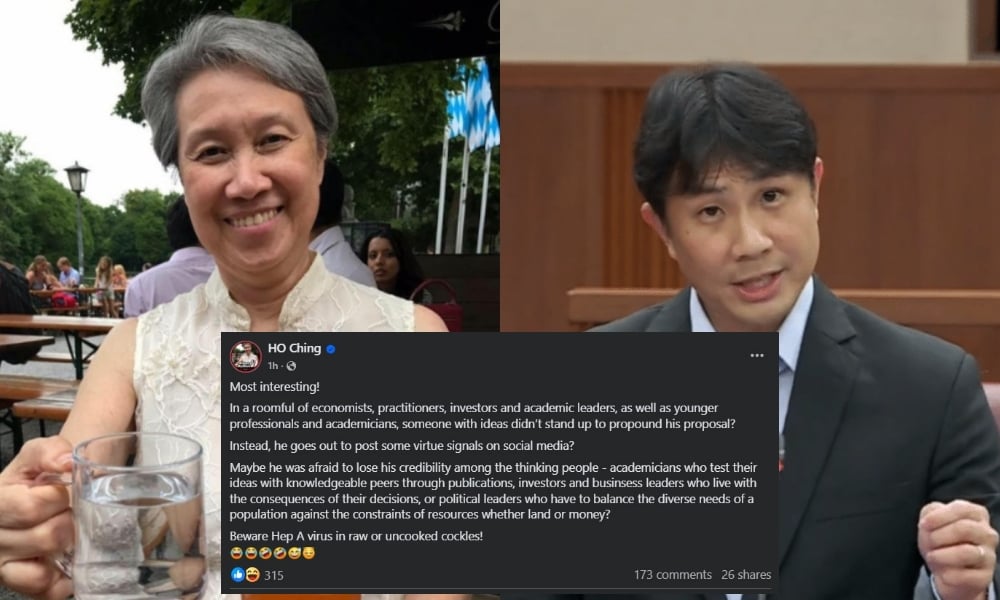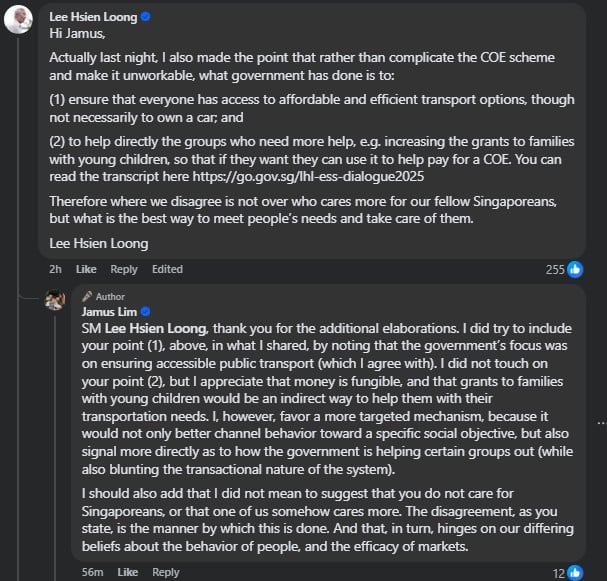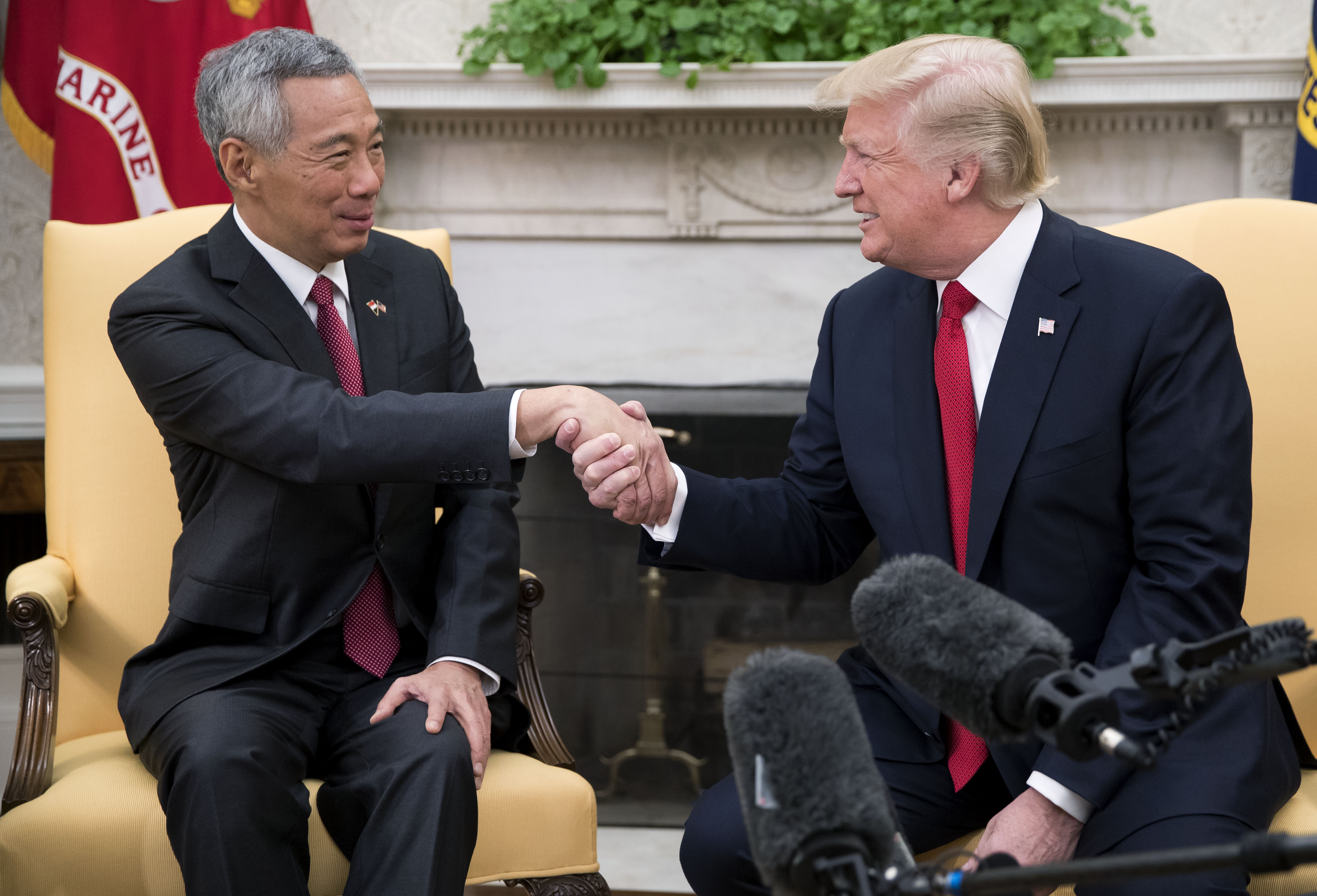- Joined
- Aug 20, 2022
- Messages
- 26,662
- Points
- 113

The Online Citizen
Comments
Ho Ching’s cryptic post raises eyebrows following SM Lee-Jamus Lim COE policy exchange
On 17 July, Ho Ching raised eyebrows with a cryptic Facebook post seemingly referencing WP MP Jamus Lim, following his policy exchange on FB with SM Lee Hsien Loong over the COE system. Her remark, warning of “Hep A virus in raw or uncooked cockles,” perplexed many and drew criticism as petty and unnecessary, especially when contrasted with the civil tone of the original debate.Published on 17 July 2025
By The Online Citizen

On 17 July 2025, Ho Ching, former chief executive of Temasek Holdings and spouse of Singapore’s Senior Minister Lee Hsien Loong, published a Facebook post that drew attention for its veiled criticism.
Though names were omitted, many netizens interpreted the remarks as directed at Workers’ Party Member of Parliament Associate Professor Jamus Lim.
Her comments followed a civil online exchange between Lim and Senior Minister Lee over Singapore’s Certificate of Entitlement (COE) policy.
SM Lee and Jamus Lim in rare Facebook dialogue on COE
The exchange began on 16 July, when Associate Professor Lim responded to comments made by Senior Minister Lee during a public dialogue on the controversial COE system.While SM Lee acknowledged concerns over the rising costs of COEs, he maintained that the system works effectively to manage Singapore’s limited road space.
“There’s really no easy way to make something which is valuable be distributed fairly, and at the same time, very cheap,” Lee said.
In contrast, Lim proposed a more empathetic approach.
He argued that while market logic is essential, it should not override key social values like compassion and equity. “There remains a pressing need to reflect such values in our policies,” Lim posted on Facebook.
In a rare move, SM Lee personally replied to Lim’s post. He clarified the Government’s priority was to maintain affordable and accessible public transport, while offering targeted financial support to those in need.
Rather than altering the COE system itself, Lee argued that targeted grants would be more effective and less complex.
Lim responded with appreciation for Lee’s engagement but reiterated that implementing direct, targeted measures would more tangibly demonstrate the Government’s support for specific vulnerable groups.

Ho Ching’s remarks seen as a pointed critique
The day after the exchange, Ho Ching posted on Facebook: “Most interesting! In a roomful of economists, practitioners, investors and academic leaders, as well as younger professionals and academicians, someone with ideas didn’t stand up to propound his proposal?”She went on to add that instead of presenting ideas during the event, the unnamed individual chose to post “some virtue signals on social media.”
Ho speculated that perhaps this person feared losing credibility among academics, business leaders, and political figures.
“Maybe he was afraid to lose his credibility among the thinking people – academicians who test their ideas with knowledgeable peers through publications, investors and businsess leaders who live with the consequences of their decisions, or political leaders who have to balance the diverse needs of a population against the constraints of resources whether land or money?”
The post concluded with a cryptic remark: “Beware Hep A virus in raw or uncooked cockles!”—a reference interpreted by many as an allusion to Lim’s 2020 General Election comment where he said it “warms the cockles of our hearts” to serve Singapore.
During a televised political debate on 1 July 2020, Jamus Lim famously stated it “warms the cockles of our hearts to work for the people of Singapore”, a line which went viral and became closely associated with him.
Ho’s use of the cockles analogy—paired with a warning about the Hepatitis A virus in undercooked shellfish—was perceived by many as a sarcastic attack.
Public reactions highlight split in opinion
The post sparked a wave of commentary.Lawyer Yeoh Lian Chuan responded publicly, questioning the tone of Ho’s remarks.
“SM Lee says that the issue shouldn’t be seen as one side caring more or less for Singaporeans, and Prof Lim agrees. And then Madam goes to post on social media that Prof Lim is engaging in virtue signalling?” he asked.
Yeoh also highlighted that the COE system already includes preferential elements, such as the Disabled Persons Scheme.
Lim’s suggestion to add further social considerations was, in Yeoh’s view, not unwarranted.

Social media seen as complementary to formal debate
Other users on social media labelled Ho’s post “petty” and “snarky”, suggesting it was unbecoming of someone of her stature.“Singaporeans welcome such open and candid exchange of views. But Ho’s post is petty af,” one comment read.
Some criticised the indirect nature of the remarks, noting that not naming the individual made the post more pointed while avoiding direct accountability.



Some netizens defended Lim’s use of social media to express his ideas, noting that open online platforms allow for broader public engagement.
One user commented that had Lim raised his points during the live event, it could have led to an unnecessary partisan exchange, turning the occasion into a PAP-WP confrontation.
Others argued that social media enabled the discussion to continue more naturally and inclusively, rather than confining it to closed-door or elite policy dialogues.

Earlier WP suggestions on vehicle quota reforms
Supporters of Lim were quick to defend his engagement with the COE issue.They pointed out that he had consistently raised concerns about the policy both inside and outside Parliament.
For instance, during the Ministry of Transport’s Committee of Supply Debate on 5 March 2025, Lim questioned the fixed 10-year COE duration. He urged the Ministry to consider changes in line with evolving electric vehicle (EV) battery life spans.
In response, Senior Minister of State Amy Khor reaffirmed the 10-year duration, citing the importance of equity and vehicle fleet renewal. She cautioned against multiple COE durations, stating it could create confusion and undermine system coherence.
In November 2024, Lim and fellow Sengkang GRC MP Louis Chua urged the Ministry of Transport to revise the vehicle quota system, particularly in light of the impending ERP 2.0 implementation.
They expressed concern that car leasing companies were exerting outsized influence on COE premiums.
In response, then Transport Minister Chee Hong Tat stated that ERP 2.0 had only modestly reduced vehicle usage—by about 6%—and that broader shifts in travel behaviour post-COVID-19 played a more significant role.
He added that the COE price increases were mainly driven by individual buyers, not leasing companies.



